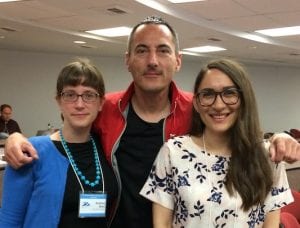This semester Andrea Sims and Micha Elsner are holding joint meetings of Andrea’s graduate morphology seminar and Micha’s graduate computational linguistics seminar. The joint seminar, focusing on Models of Morphological Learning and Change, is designed to bring together students with backgrounds in morphology, computational linguists, language acquisition, and historical and sociolinguistics… but not necessarily more than one of these. It is an experiment in talking across subdisciplinary boundaries, with the hope that the whole will be more than the sum of its parts (not unlike morphological structure!). We are excited to see what projects will develop!
Seminar description: Where do languages come from, and how do they evolve? We learn the languages we speak as infants or students; as adults, we transmit them to new generations of speakers. In a variety of linguistic sub-areas, researchers have claimed that this process of iterated language learning influences the kinds of languages which exist in the world (language typology) and the process of language change over time. Many of these researchers have proposed computational models of this process, enabling the rapid simulation of “learners” exposed to different language inputs, and of many generations of “teaching” and “learning”.
This seminar will investigate the learning process, with special reference to the case of inflectional morphology (grammatical forms of a word, such as singular cat ~ plural cats). We will bring together research in several areas of linguistics in order to discover how the different perspectives taken across sub-communities combine (or fail to combine!) to address the problem. The reading list will cover:
- Typology of inflectional systems: what sort of languages are out there
- Learning-based theories of morphological typology and change
- Cognitive models of morphological learning
- Engineering models of inflection prediction
- Computational work on iterated language learning


